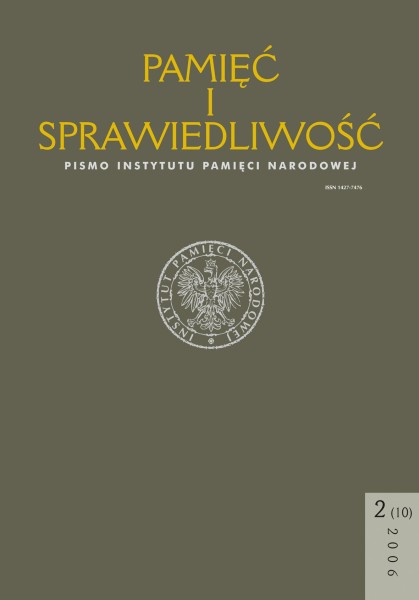Prawo i wymiar sprawiedliwości PRL wobec przestępczości gospodarczej (1956–1970)
Pamięć i Sprawiedliwość, Том 10 № 2 (2006), pages: 143-166
Publication date: 2006-12-30
Аннотация
In the last period a several important works about economic delinquency have been published. One of the most interesting is a book by Dariusz Jarosz and Maria Pasztor „Meat swindle. Facts and conditions”. Issues discussed in the book cover not only the
meat swindle in Warsaw. This is one of the reasons why the article „Law and jurisdiction of communist Poland and economic delinquency in 1956–1970” does not describe the economic delinquency, but presents struggle of structures fi ghting it, shows their relations and functioning at the regional level.
The functional attitude means that not only normative institutions, such as public prosecutor or jurisdiction were investigated, but PZPR activities were also considered. When influence of PZPR on jurisdiction institutions is discussed, apart from the quasilaw
system (e.g. resolutions of Central Committee of PZPR, directives of Politic Bureau of CC PZPR) the attention was drawn to the infl uence of high factor of PZPR membership of jurisdiction employees on their institutions.
A look on the prevention and repressions against economic delinquency from the institutional point of view allows to answer the question of how much each of the activities was reaction to social moods, how much a derivative of communistic ideology,
and how much the effect of institutions’ conditions. The author opts for the last interpretation (which is often underestimated) although he naturally does not omit the first two ones.
The source analysis allows to see three turning points in the described period. The distinguishing feature of 1956–1959 was the decisional chaos in the institutions responsible for fi ghting economic delinquency, which was caused by weakened control of
party and state authorities. In 1961–1965 the authorities regained control over jurisdiction and made it an obedient, although not always effi cient, tool, seeing the panaceum in tightening restrictions for economic delinquency. In the last fi ve years the stress was put on operational and prevention methods, and on the institutional level the role of jurisdiction and public persecutor was decreased in favour of e.g. citizen’s militia.
Наиболее читаемые статьи этого автора (авторов)
- Krzysztof Madej, Łukasz Kamiński, Paweł Piotrowski, Wojciech Wrzesiński, [Recenzja] Opozycja demokratyczna w Polsce w świetle akt KC PZPR (1976–1980). Wybór dokumentów, wybór, wstęp i opracowanie Łukasz Kamiński i Paweł Piotrowski, przedmowa Wojciech Wrzesiński, Wydawnictwo Gajt, Wrocław 2002, ss. 348 , Pamięć i Sprawiedliwość: Том 3 № 1 (2003)
- Krzysztof Madej, Wszyscy byli przemytnikami. Obraz przestępczości przemytniczej i dewizowej w latach 1956–1970 , Pamięć i Sprawiedliwość: Том 13 № 2 (2008)
- Krzysztof Madej, [Recenzja] Adam Leszczyński, Sprawy do załatwienia. Listy do „Po prostu” 1955–1957, Wydawnictwo TRIO, Warszawa 2000, ss. 222 , Pamięć i Sprawiedliwość: Том 1 № 1 (2002)
- Krzysztof Madej, [Recenzja] Teresa Bochwic, Narodziny i działalność Solidarności Oświaty i Wychowania 1980-1989, Tysol, Warszawa 2000, ss. 373. Wybór źródeł do historii Solidarności Oświaty i Wychowania, oprac. Jacek Żurek, Tysol, Warszawa 2000, ss. 584 , Pamięć i Sprawiedliwość: Том 1 № 1 (2002)
- Krzysztof Madej, Droga na szubienicę , Pamięć i Sprawiedliwość: Том 2 № 2 (2002)
- Krzysztof Madej, [Recenzja] Aleksander Pawlicki, Kompletna szarość. Cenzura w latach 1965–1972. Instytucja i ludzie, Wydawnictwo „Trio”, Warszawa 2001, ss. 167 , Pamięć i Sprawiedliwość: Том 2 № 2 (2002)
- Krzysztof Madej, Opozycja w PRL 1956–1980. Stan badań , Pamięć i Sprawiedliwość: Том 4 № 2 (2003)
 Język Polski
Język Polski
 English
English
 Deutsch
Deutsch
 Français (France)
Français (France)
 Italiano
Italiano
 Русский
Русский


 PDF (Język Polski)
PDF (Język Polski)
